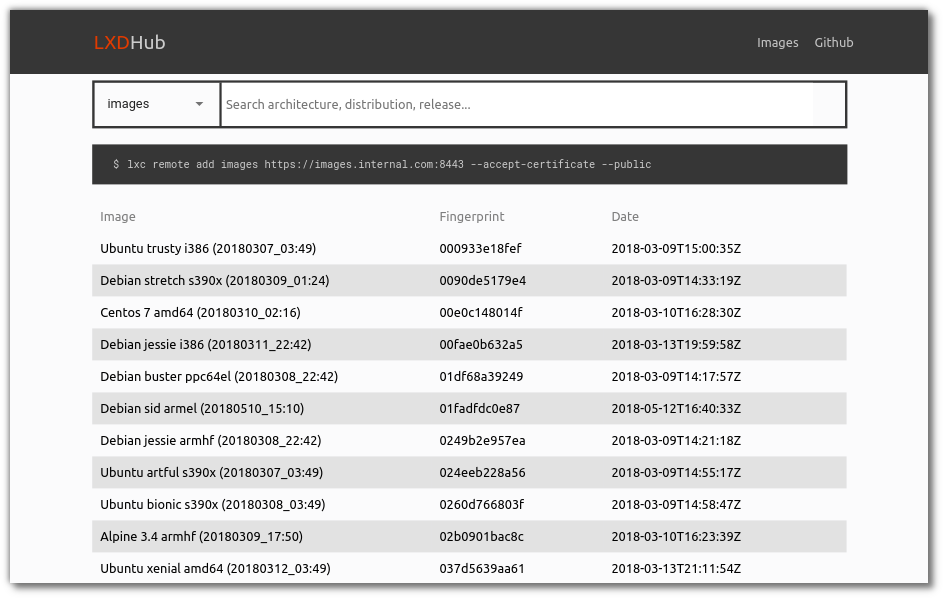Display, search and copy LXC images using a web interface.
LXDHub is a management system for linux containers (LXC). With LXDHub you can visualize LXC images of multiple (private & public) remotes. One of the key features of LXDHub is to clone LXC images from one remote to another. Therefor you can mirror public remotes to your private remote.
The fastest way to run LXDHub on your computer is by pulling the LXDHub LXC image from our public remote.
lxc remote add lxdhub https://lxdhub.xyz:8443 --accept-certificate --public
lxc launch lxdhub:lxdhub mylxdhub
lxc info mylxdhub | grep "eth0:.*inet" | head -n1 | awk '{print "Open http://"$3":3000 in your browser"}'
Adding your remotes:
lxc exec mylxdhub -- su -l lxdhub -c "cat << EOF >> ~/lxdhub/lxdhub.yml
- name: efiks
url: https://images.efiks.ovh:8443
protocol: lxd
public: true
readonly: true
EOF"
# restart the services
lxc exec mylxdhub -- systemctl restart lxdhub-dbsync.service
lxc exec mylxdhub -- systemctl restart lxdhub.service
LXDHub can also be installed with other technologies:
Important Note: these playbooks were tested in the following environment:
- ansible >= 2.5.1
- Ubuntu
- lxc (snap/native)
one can use the roles in the ansible folder to deploy lxdhub on their own server.
cd ansible
ansible-playbook deploy.yml -D -vvone can also parametrize the container_name and lxdhub_version to be checked out as extra-vars.
ansible-playbook deploy.yml -D -vv -e "container_name=next-lxdhub" -e "lxdhub_version=v1.8.0"
This call will:
- create you a local
lxdhubcontainer (default) - clone, build lxdhub inside of this container
- setup systemctl services
- publish an image in your local: remote
Under the hood, LXDHub is split in five packages. The following graph visualizes the dependencies of each package.
| Name | Version | Description |
|---|---|---|
| @lxdhub/web | The LXDHub webinterface | |
| @lxdhub/api | The REST API for the LXDHub webinterface | |
| @lxdhub/dbsync | The script to synchronize multiple LXD remotes with the LXDHub database | |
| @lxdhub/db | The package, which provides database functions for the @lxdhub/api and @lxdhub/dbsync packages | |
| @lxdhub/common | The package, which provides common functions for all LXDHub-packages. |
The packages @lxdhub/db and @lxdhub/common are solely libraries, which can not be run seperatly. Whereas the packages @lxdhub/web, @lxdhub/api and @lxdhub/dbsync can be run seperatly via Docker or NodeJS.
Run the automated test cases with NodeJS.
docker build -t $USER/lxdhub .
docker run -it brunnel6/lxdhub test
docker run -it brunnel6/lxdhub lint
- @lxdhub/web: The LXDHub webinterface
- @lxdhub/api: The REST API for the LXDHub webinterface
- @lxdhub/dbsync: The script to synchronize multiple LXD remotes with the LXDHub database
- @lxdhub/db: The package, which provides database functions for the
@lxdhub/apiand@lxdhub/dbsyncpackages - @lxdhub/common: The package, which provides common functions for all LXDHub-packages
- CONTRIBUTING.md: The contributing guidelines
- COPYRIGHT: Copyright informations
- publish.md: Documentation on how LXDHub is being published
- LXC: The underlying technology behind LXDHub
- Livio Brunner - Author
- Eric Keller - Idea


